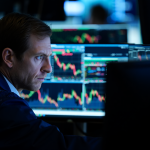
Income Investing Strategy: Where Psychology Meets Strategy
Oct 27, 2024
The Unseen Forces of Market Behavior
In 1720, Sir Isaac Newton lost a fortune in the South Sea Bubble. “I can calculate the motion of heavenly bodies,” he lamented, “but not the madness of people.” Even the father of modern physics, with his brilliant mathematical mind, fell prey to market psychology. Centuries later, we’re still wrestling with the same demons, perhaps with better tools to understand them.
Picture this: Every day, millions of investors make decisions based not on careful analysis but on gut feelings, fears, and hopes. These emotional undercurrents create ripples that turn into waves of market movement. Yet within this chaos lies opportunity – predictable patterns of human behaviour that repeat with almost mathematical precision.
Think about it. When was the last time you made an investment decision purely on logic? If you’re like most people, your answer might surprise you. The truth is that our brains are wired for survival, not statistical analysis. We fear losses twice as much as we celebrate gains – a quirk of psychology that creates consistent market inefficiencies.
This isn’t just theory. While traditional income investing focuses on dividends and yields, a deeper understanding of market psychology opens up new avenues for generating returns. It’s like playing chess while everyone else is playing checkers – same board, different game.
Let’s explore how understanding these psychological patterns can transform our approach to income investing, turning market irrationality into a reliable source of returns. After all, in a world where everyone has access to the same information, your edge lies in understanding what others fail to see—the predictable unpredictability of human nature.
The Crowd Has Many Heads, But No Brain
The financial markets are often likened to a complex, ever-changing organism driven by the collective decisions of countless individuals. Yet, if we peer beneath the surface, we find that this organism is governed by underlying forces that are inherently psychological. As Niccolò Machiavelli stated, “Everyone sees what you appear to be, but few experience what you are.” This insight becomes profoundly relevant when considering the facades of confidence and certainty that pervade the markets, masking the underlying unpredictability of human behaviour.
So, how can investors gain an edge in this theatre of human nature? By recognizing that market behaviour is not purely rational but is influenced by the collective psychology of the crowd. Enter Sigmund Freud, who delved into the unconscious motivations that drive us, suggesting that our actions are often governed by forces beyond rational comprehension. Freud’s work highlights the impact of emotions, desires, and fears on our decision-making, revealing the irrationality that lurks beneath the surface of even the most sophisticated investors.
The Bias Within: Behavioral Economics and the Irrational Investor
To further understand the interplay between psychology and financial choices, we turn to Daniel Kahneman, a Nobel laureate whose work revolutionized behavioural economics. Through his research with Amos Tversky, Kahneman unveiled the myriad ways human judgment deviates from rationality. Concepts like prospect theory, loss aversion, and anchoring demonstrate that cognitive biases and emotional factors often sway our financial decisions.
For example, loss aversion suggests that the pain of losing is psychologically twice as powerful as the pleasure of gaining. This bias can lead investors to make overly conservative choices, causing them to miss out on potential gains or hold onto losing investments too long, hoping for a rebound. Understanding these biases and their impact on market behaviour is crucial for investors aiming to make more rational decisions.
Case Study: The Madness of Crowds
One of the most striking examples of collective psychology’s influence on markets is the Dutch Tulip Mania of the 1630s. This event stands as a testament to the power of herd behaviour, where individuals followed the crowd, buying tulips at ever-increasing prices, driven by fear of missing out and the actions of those around them. Similar patterns emerged during the Dot-com bubble of the late 1990s, when investors piled into technology stocks, and the housing market crash in 2008, fueled by a collective euphoria that blinded many to the underlying risks.
These events highlight the impact of psychological factors on market dynamics, demonstrating that markets are not purely rational entities. As Warren Buffett, the renowned investor, once said, “Be fearful when others are greedy, and greedy when others are fearful.” Buffett’s wisdom encourages a contrarian approach, urging investors to go against the herd mentality and exploit market anomalies.
Strategic Advantage: Leveraging Options in Volatile Times
When panic grips the markets, savvy investors recognize the opportunity to leverage behavioural insights. During a market crash, asset prices often fall below their intrinsic values due to irrational selling. This is where the strategic use of options comes into play. By selling put options on blue-chip stocks after a market downturn, investors can generate significant income from elevated option premiums, which spike as fear takes hold. This approach, advocated by Buffett, involves being paid to buy high-quality stocks at discounted prices potentially.
Additionally, reinvesting some of these premiums into call options can create a leveraged position with limited downside risk. This strategy turns the tables on traditional investing, capitalizing on the emotions that unnerve most investors. It is a bold move that requires a deep understanding of market psychology and a contrarian mindset.
The Brain’s Role: Neuroeconomics and Market Volatility
Advancements in neuroeconomics have shed light on the biological underpinnings of financial decision-making. Functional MRI scans reveal that specific brain regions, such as the nucleus accumbens and the insula, are activated during monetary gains and losses. The nucleus accumbens, associated with reward processing, becomes active when individuals anticipate profits, while the insula, linked to fear and anxiety, responds to potential losses.
Understanding these neural mechanisms offers insights into market behaviour during volatile periods. For instance, during a market crash, when fear dominates, the collective activation of the insula across investors can lead to excessive selling, creating opportunities for contrarian investors who recognize the psychological forces at play.
Mastering the Dance: Embracing the Intersection
The interplay between psychology and strategy in the financial markets is a delicate dance. By embracing the wisdom of Machiavelli, Freud, and Kahneman, investors can navigate market complexities with a nuanced perspective. Recognizing that every price movement reflects market participants’ collective emotions and biases allows for a more strategic approach. It involves anticipating shifts driven by psychological factors and turning these phenomena into advantages.
This dance requires discipline, self-awareness, and a willingness to challenge conventional wisdom. Investors must acknowledge their biases, such as overconfidence or confirmation bias, and develop strategies to mitigate their impact. Mechanical trading systems or algorithmic models can help remove emotional interference, but even these tools are not immune to the biases of their creators.
Know Thyself, Then Trade: Ancient Wisdom for Modern Investors
In the ancient world, philosophers like Aristotle and Socrates emphasized the importance of self-knowledge and understanding human nature. This wisdom remains pertinent for modern investors. By recognizing and accepting our psychological biases, we can make more rational decisions and avoid being swayed by the crowd. As Socrates said, “The unexamined life is not worth living.” For investors, the unexamined decision can be costly.
This self-awareness also extends to understanding our risk tolerance and emotional resilience. Knowing your limits and how you respond to market volatility is crucial for developing a sustainable investment strategy. As the ancient investor Jacob Rothschild once noted, “Buy when there’s blood in the streets, even if the blood is your own.” This provocative statement highlights the importance of emotional fortitude in market turmoil.
Final Thoughts: Unlocking the Power of Psychological Strategy
In conclusion, combining psychology and strategy in income investing is a powerful approach that challenges conventional wisdom. By recognizing that markets reflect our collective hopes, fears, and irrationalities, investors can position themselves advantageously. It is not just about numbers and charts but about understanding the human elements that drive market behaviour.
The key lies in embracing human psychology’s unpredictable nature and using it to anticipate and influence market shifts. As Sun Tzu, the ancient Chinese military strategist, advised, “In chaos, there is also opportunity.” Investors who master this intersection of psychology and strategy can harness the power of chaos, turning it into a strategic advantage.
As we reflect on the ancient wisdom and modern insights presented in this essay, let us embrace the unpredictable nature of the markets with a renewed sense of curiosity and strategic thinking. By studying the human elements that drive market behaviour, we can unlock the potential to generate income and create long-term wealth.
Ultimately, it is not just about financial gains but also the intellectual pursuit of understanding the complex interplay between psychology and strategy in the economic realm. It is through this unique lens that we can become truly wise investors.










